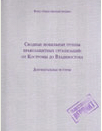
Crisis of the Law Enforcement System in Russia. Statement of Problem and Recommendations to the International Actors.
May 30, 2005 21:59
Since the early nineties comprehensive reform of the public administration have taken place. Law enforcement system and particularly the penitentiary have been also affected by this process. However complete and consistent reform of the law enforcement sphere has not occurred.
Substantive number of organization and functioning principles of the Soviet system remained rooted whiting the law enforcement, even though such principles are inadequate to the current social and economical realities. In addition, poor finical support of the law enforcement in the nineties led to significant decrease of professional capacity of the law enforcement bodies and to a major rise in corruption.
Now the law enforcement system is not capable to guarantee the necessary level of public security and protection of individuals from unlawful acts. At the same time, law enforcement bodies themselves started representing a source of danger for the society. The main public sentiments concerning law enforcers are fear and distrust. These evidently conflicting relations are certainly among the factors contributing to the instability in Russian as a whole.
Russian authorities acknowledge the existence of serious problems in the law enforcement sphere. The Prosecutor General and the Prime Minister in their public statements as well as the President in his annual State of the Nation Address specifically mentioned unsatisfactory work of the law enforcement and the public discontent on this regard. However, the competent authorities have offered no concrete measures to improve the situation apart criminal prosecution of police officers that commit violations. The law enforcement reform developed under the direction of Dmitriy Kozak has not been launched. Neither the contents of this reform nor the reasons for its rejection (or postponement) have been brought to public attention.
Nevertheless, there exists a strong public demand for a law enforcement reform, of which Russian authorities are well aware. We believe that the international community may encourage the Russian Government to focus on this process. In particular, a discussion of this issue within the framework of the Russia-EU human rights consultations and other inter-state dialogues on human rights and democracy may stimulate a reform. In this context, relevant experience of those democratic countries, which recently conducted a modernization of the law enforcement and police (UK, France and others) may be especially helpful. Among the priority topics for discussion, we would like to stress the following: optimization of funding of the law enforcement system, modernization and decentralization of administration of the law enforcement activities, recruitment policy and training of personnel, development of relations between the law enforcement bodies and the public, including the introduction of effective civilian oversight mechanisms.
International actors may interact with the Russian authorities in the frame of inter-state programs of technical assistance. At the same time, it is also important that they consistently support activities of non-governmental - human rights and expert - organizations aimed to promotion of the law enforcement reform, development of a civilian oversight system and suppression of arbitrariness and other negative practices in the law enforcement sphere.
May 2005






